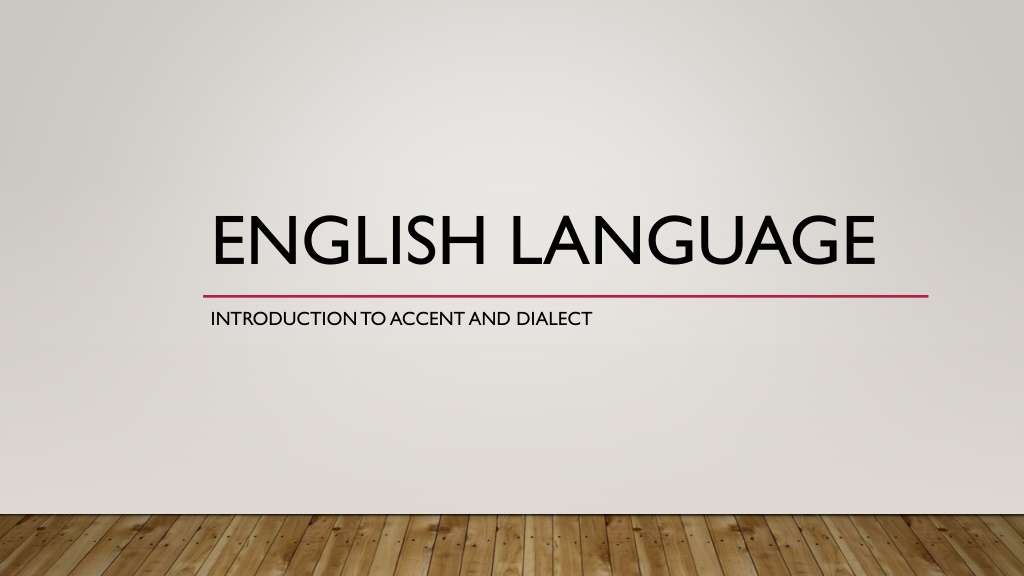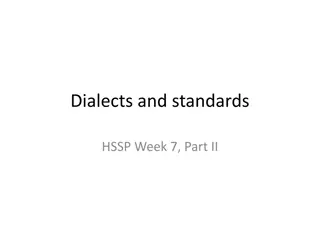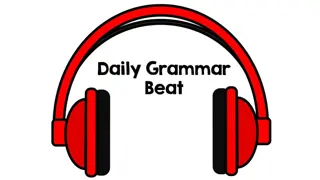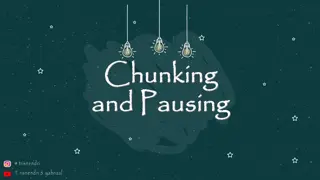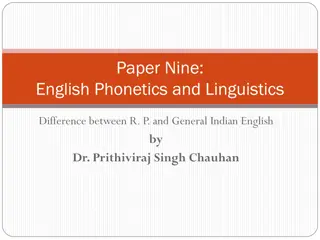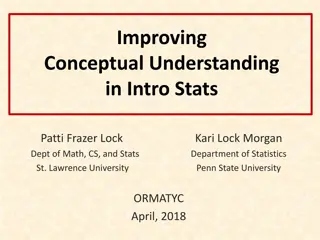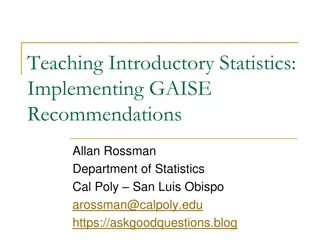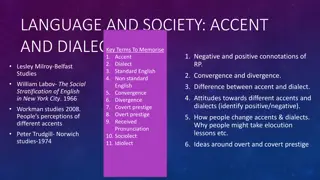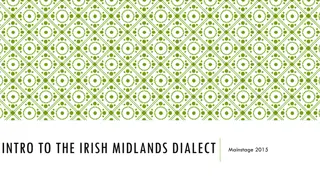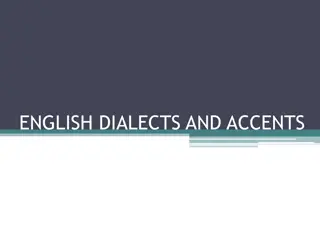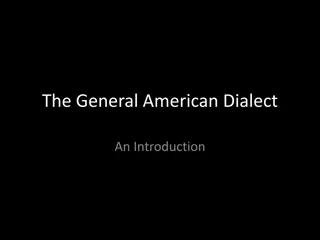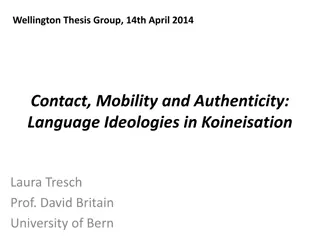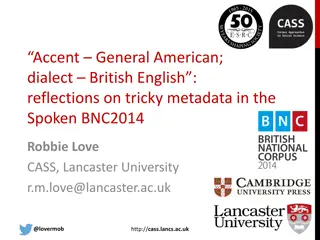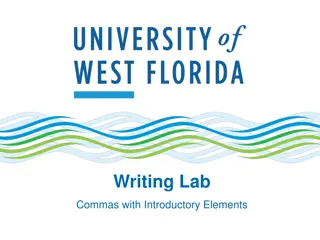Understanding Accent and Dialect: An Introductory Study
Delve into the world of accents and dialects with a focus on pronunciation and language usage. Explore the significance of regional features in speech and how accents shape our identities. Discover the nuances of different accents, reflect on personal preferences, and challenge stereotypes associated with various regional dialects.
Download Presentation

Please find below an Image/Link to download the presentation.
The content on the website is provided AS IS for your information and personal use only. It may not be sold, licensed, or shared on other websites without obtaining consent from the author. Download presentation by click this link. If you encounter any issues during the download, it is possible that the publisher has removed the file from their server.
E N D
Presentation Transcript
ENGLISH LANGUAGE INTRODUCTION TO ACCENT AND DIALECT
INTRODUCTION TO ACCENT AND DIALECT STUDY Read the following definition of accent and dialect carefully: Where we are from is important to people hence support for football teams from our home region, returning to our roots at Christmas, etc. Nearly all of us have regional features in the way we speak and this is part of our identity. We all speak with an accent and we all speak a dialect. Accent: the way we pronounce English. Since we all pronounce when we speak, we ALL have an accent. Most people s accents will have some regional features. 3-5% of speakers in England may use the totally regionless accent of Received Pronunciation, either because they have been to one of the big public schools or because they want to sound as if they have. NOTE Received Pronunciation (normally shortened to R.P.) is describes as regionless because if someone has that accent you cannot tell where in the country they are from. (However, you can probably tell something about the social class they belong to and what their educational background may be.) Dialect: not only pronunciation, but also the words and grammar that people use: Most regional dialects are spoken with a corresponding regional accent (eg Lancashire dialect + Lancashire accent). [ from Peter Trudgill English Dialects]
INTRODUCTION TO ACCENT AND DIALECT STUDY You will realise that: ACCENT relates to our pronunciation. DIALECT relates to the words and grammar we use. (Often the term dialect is used as a term to encompass all three aspects of language.) To get an idea of the different accents we hear in the UK, watch the video clip. Make a list of the ten accents referred to in the clip. You should notice that whilst the examples show speakers who sound very different from yourself, you can understand most of what most of the speakers are saying. Pick two of the accents you are familiar with and try to imitate them yourself! You should notice that the sounds you change most are the vowel sounds in the words.
INTRODUCTION TO ACCENT AND DIALECT STUDY Some key points to note from the video clip Accents are hard to copy! Speakers with a particular regional accent can nearly always spot someone who is imitating the accent but isn t from their area. This shows us how deeply embedded into our identity our accents are. People often hold particular attitudes, both negative and positive, to different accents. Most of us have an accent we particularly like the sound of, I love the ______ accent! is a common thing to hear. Likewise, we often have an accent we dislike, Oh! I hate the _____ accent. We heard on the video the presenter saying that the Birmingham accent is regarded by many as making people sound unintelligent. This prejudice is related much more to social attitudes that to any specific feature of the accent. TASK make a list of your own favourite and least favourite accents. Try to write down your reasons for liking and disliking them. Are your reasons to do with the actual sound of the accent or things that you associate with the accents and people who have them? For example, many people say they like the West Country accent (Devon, Cornwall, Somerset etc.) but this part of the country is a very popular holiday destination so people may associate the accent with happy memories. Many people say they dislike the Liverpool accent (scouse) but often this will be because of social stereotypes about Liverpudlians rather than anything to do with the actual sound of the accent.
INTRODUCTION TO ACCENT AND DIALECT STUDY Some key points to note from the video clip Certain accents are regarded as having high prestige RP is referred to in the video as the stereotypically, quintessential British accent . This attitude is created by the fact that many RP speakers have status and hold positions of power in our society. Accents and dialects go hand in hand we hear the presenter saying about the Ulster (Northern Irish) accent that there is a whole dialect to get your head around too. Remember: when we talk about dialect we are talking about the words (lexis) and the grammatical structures which people use alongside the way they pronounce the language. We will look at dialect words next ( linguists normally refer to this as lexis).
Introduction to Accent and Dialect Study Write down what you would call the things in the images below. 4 3 1 2 8 5 6 7
INTRODUCTION TO ACCENT AND DIALECT STUDY - LEXIS So the Standard English (see note below) terms for the items are on the left of the table below, some alternatives you may have said if you are from Lancashire are listed on the right. STANDARD ENGLISH DIALECT WORDS 1. bread roll 1. barm/barmcake (these are very much associated with Lancashire), bap 2. plimsolls 2. pumps, daps 3. trousers 3. kecks, pants (note, in the south of England, pants refers strictly to underpants!) 4. dinner 4. Tea (note: whether you call the meal you have in the evening or at midday dinner or tea is often associated with your social class.) 5. ice lolly 5. Majority of you will have said this but if you re from near Liverpool you mayhave called this a lolly ice 6. sofa (?) 6. Debate around this one! Couch , settee are other possibles 7.chewing gum 7. chewie, chuddy (Note 2nd underpant connection!) Chuddies is also a Hindi word sometimes heard from British Asian speakers - it means underpants. There is no known connection between the two! 8. alleyway 8. ginnel ( a word often heard in Lancashire) Standard English The dialect normally used in writing and spoken by the most powerful and educated members of the population. It is a minority dialect, spoken by perhaps 12-15% of the population. About 7-12% of Standard English speakers speak it with a regional accent like Huw Edwards the newsreader, (Standard English Welsh accent). (P Trughill English Dialects)
INTRODUCTION TO ACCENT AND DIALECT STUDY - LEXIS Here s another video clip to watch. It helps us understand how dialects can be confusing for foreign learners of English. Here s Korean Billy trying to help out his Youtube followers with Lancashire English! (You ll be pleased to know that Korean Billy does many other regional English Dialects! Just look for him on Youtube.) TASK Think of some local expressions you might use which could be confusing for a foreign learner of English. Write a brief explanation of them. For example It s cracking flags for it being really hot. You d definitely have to explain that the word flags in the phrase relates to flagstones used for pavements and not things you wave at events!
INTRODUCTION TO ACCENT AND DIALECT STUDY - GRAMMAR The final area we will look at is Grammar. Read carefully the definition of Grammatical variation given below and the note about how linguists refer to grammatical variation: NOTE There is no wrong and right Many people who haven t studied language in the detail you will be doing will often talk about right and wrong , or correct and incorrect grammar. They are normally only thinking about Standard English (remind yourself of the note on slide 6). Linguists therefore prefer the terms, standard and non- standard English. Over the course we will explore these differing attitudes to English grammar. Grammatical variation Grammar is the structure of a language or dialect. It describes the way individual words change their form, such as when play becomes played, to indicate an event in past time. Grammar is often paired with syntax, the way words are combined to form phrases or sentences - basically the order words go in. To make things easier, we normally use Grammar to talk about both. Look at these pairs of sentences: 1a I were stood in the queue 1b I was standing in the queue 2a I ll not do it. 2b I won t do it. One of each pair is Standard English, the other is non-standard English (see note) it s an example of what a Lancashire dialect speaker might say. I m sure you will spot which is which! As you progress through the course you will learn how to linguistically describe these differences using grammatical terminology. If you would like to challenge yourself and see what you already know about grammar, see the extension task on the last three slides of this presentation.
INTRODUCTION TO ACCENT AND DIALECT STUDY RECAP AND EXTENSION TASKS Key learning points The difference between accent and dialect How dialect and accents show differences in pronunciation, lexis and grammar. No one dialect is linguistically better that another they are just different! Work at Home Talk with your parents and grandparents about their accents and dialects. Ask them if they can think of any dialect words or dialect expressions that people used to use and that aren t heard as much among your generation. Ask them if they think that people s local accents are as strong as they used to be. Note down what they say and bring this to the next lesson.
INTRODUCTION TO ACCENT AND DIALECT STUDY GRAMMAR EXTENSION TASK More detailed explanation of Grammatical variation happen she were wearing a mask The construction she were wearing a mask might sound unusual to some ears, but in some dialects in northern England and the Midlands, many speakers indicate the past tense of to be by saying I were, you were, he, she and it were, we were and they were. This means the verb is unmarked for person, while speakers of Standard English differentiate by using I was, she/he/it was and they/we were. Some dialects, perhaps particularly those in the South East of England, favour a similarly unmarked version using the singular form of the verb I was, you was, he, she and it was, we was and they was. There is no wrong and right We should avoid the temptation to draw misguided conclusions about what is correct and incorrect grammar. The northern and southern dialect patterns are more regular than Standard English, and indeed mirror the model for every other verb consider I played, you played, I went, you wentand so on. Linguists therefore don t talk about right and wrong grammar but make a distinction between standard and non- standard grammar, where Standard English refers to what many people consider a prestigious form, mainly because people in positions of authority use it and because of its universal acceptance as the written norm. (from the British Library website.)
INTRODUCTION TO ACCENT AND DIALECT STUDY GRAMMAR EXTENSION TASK Depending on where you live in the country you may hear the following dialect expressions. The table shows the difference between the Standard English version and the dialect versions. TASK identify what type of words (e.g. verbs, nouns etc.) create the difference between the two versions of the statements. They are in bold to help you. If you are unsure, look up the word in a good dictionary (online or paper!) next to it, it will say what word class it belongs to. See below right for a dictionary entry example and note on abbreviations used in dictionaries) Standard English I did it A man that I know He doesn t want any dessert Dialect version I done it A man what I know He don t want no dessert She ain tcoming I seen her I walked four mile I was stood at the bus stop 1 2 3 Common dictionary abbreviations for word classes n = noun v = verb adj = adjective adv = adverb pron = pronoun prep = preposition conj = conjunction det = determiner Example dictionary entry Happy adjective UK / h p.i/ US / h p.i/ happy adjective (PLEASED) A1feeling,showing, or causing pleasure or satisfaction 4 5 6 7 She isn t coming I saw her I walked four miles I was standing at the bus stop FromCambridge English Dictionary
INTRODUCTION TO ACCENT AND DIALECT STUDY GRAMMAR EXTENSION TASK Grammatical differences between dialects You should have noticed that in several of the examples the form of the verb is different. This is true for 1,3,4,5 and 7 3 has two differences the second one is the use of no as a determiner. It creates what is known in English as a double negative. In example 2 it is a different relative pronoun In example 6 it is the noun many dialects do not pluralise some nouns.
